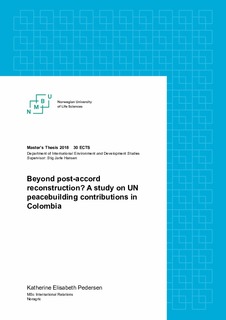| dc.contributor.advisor | Hansen, Stig Jarle | |
| dc.contributor.author | Pedersen, Katherine Elisabeth | |
| dc.coverage.spatial | Colombia | nb_NO |
| dc.date.accessioned | 2018-10-23T13:05:31Z | |
| dc.date.available | 2018-10-23T13:05:31Z | |
| dc.date.issued | 2018 | |
| dc.identifier.uri | http://hdl.handle.net/11250/2569172 | |
| dc.description.abstract | Intrastate conflicts pose a great threat to the international peace and security, and the UN is one of the organizations mandated to protect the international community. Thorough peacebuilding processes are important in order to move the conflict-ridden states from war to sustainable peace, and the purpose of this study is to examine to what extent the United Nations is equipped to support in peacebuilding processes of intrastate conflicts. Using the peacebuilding process in Colombia as a context, this study examines their efforts to support such a process.
The theoretical frameworks of post-liberal peace and Lederach’s comprehensive peacebuilding framework could help examine to what extent the UNs capabilities currently have the necessary scope to effectively support peacebuilding in intrastate conflicts. Using these frameworks, it is deduced that it would be useful for the UN to move beyond the “traditional” understanding of peacebuilding as a post-accord activity, and to view peacebuilding as a wider process that contains all the necessary steps to move from conflict to a sustainable peaceful state. It was not necessarily found that the UN has made use of a wider understanding of peacebuilding, but it was found that they manage a range of other activities that can support peacebuilding and that their mandate does provide the opportunity to interfere if need be.
It was also found that both scholars and UN member states have pushed for change and argued for ways that the UN can improve, and that several reviews of the missions and the peacebuilding architecture has been conducted in the past decades. According to the findings in this study, the latest review in 2015 has not managed to put the UN peacebuilding on a desired level, but promising steps towards understanding peacebuilding as a larger process have been made. It is recognized that the UN has a challenging task trying to balance the respect for state sovereignty and the need to protect the security and human rights in the international society, and it will be interesting to follow the developments in the years to come. | nb_NO |
| dc.language.iso | eng | nb_NO |
| dc.publisher | Norwegian University of Life Sciences, Ås | nb_NO |
| dc.rights | Attribution-NonCommercial-NoDerivatives 4.0 Internasjonal | * |
| dc.rights.uri | http://creativecommons.org/licenses/by-nc-nd/4.0/deed.no | * |
| dc.subject | Peacebuilding | nb_NO |
| dc.subject | United Nations | nb_NO |
| dc.subject | Colombia | nb_NO |
| dc.subject | Intrastate conflicts | nb_NO |
| dc.title | Beyond post-accord reconstruction? : a study on UN peacebuilding contributions in Colombia | nb_NO |
| dc.type | Master thesis | nb_NO |
| dc.subject.nsi | VDP::Samfunnsvitenskap: 200::Statsvitenskap og organisasjonsteori: 240::Internasjonal politikk: 243 | nb_NO |
| dc.description.localcode | M-IR | nb_NO |

